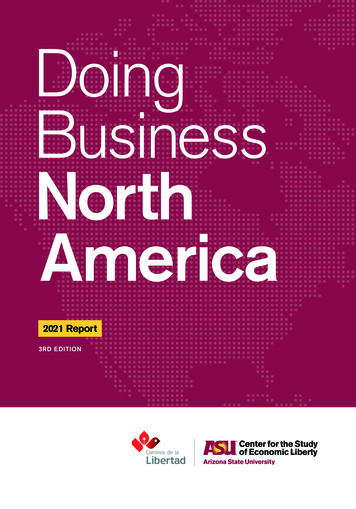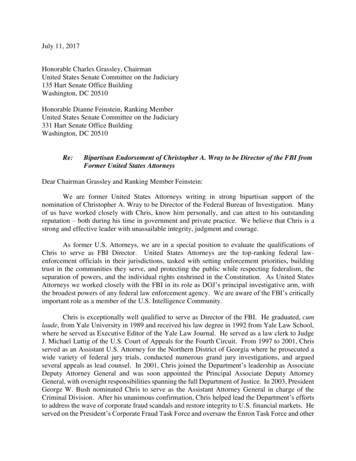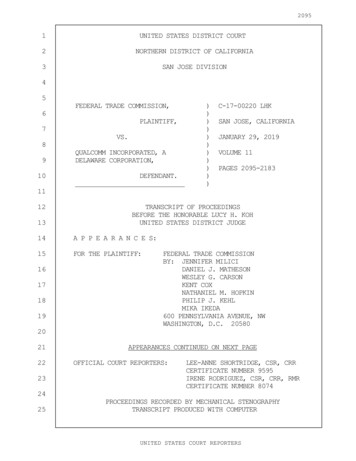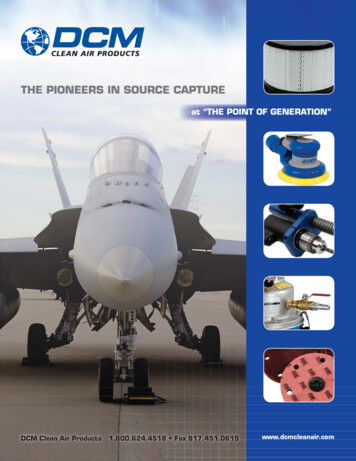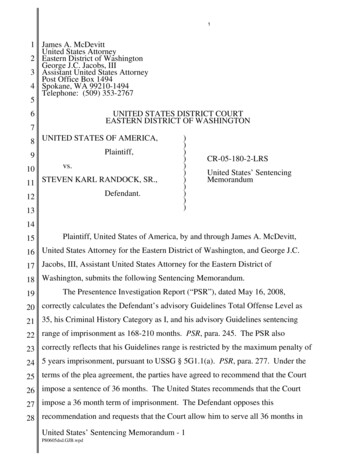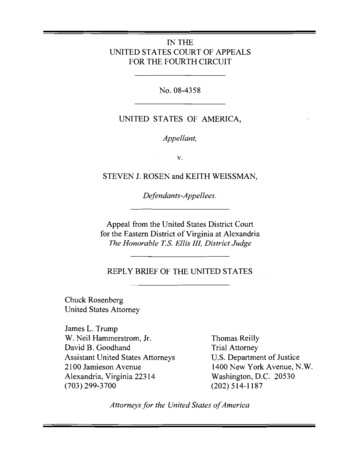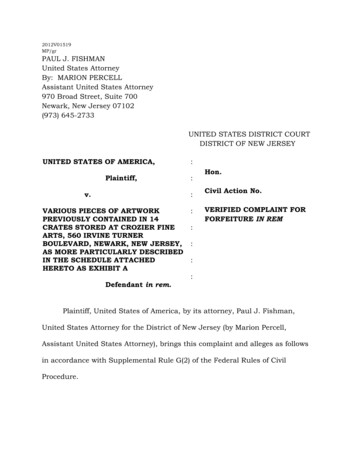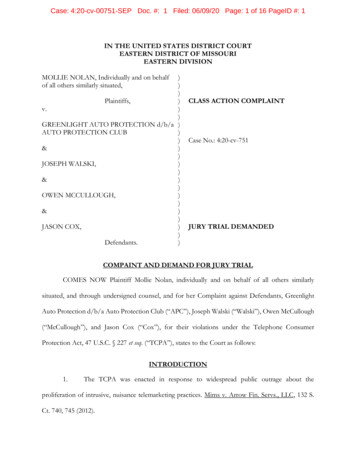
Transcription
Case: 4:20-cv-00751-SEP Doc. #: 1 Filed: 06/09/20 Page: 1 of 16 PageID #: 1IN THE UNITED STATES DISTRICT COURTEASTERN DISTRICT OF MISSOURIEASTERN DIVISIONMOLLIE NOLAN, Individually and on behalfof all others similarly situated,)))Plaintiffs,)v.))GREENLIGHT AUTO PROTECTION d/b/a )AUTO PROTECTION CLUB))&))JOSEPH WALSKI,))&))OWEN MCCULLOUGH,))&))JASON COX,))Defendants.)CLASS ACTION COMPLAINTCase No.: 4:20-cv-751JURY TRIAL DEMANDEDCOMPAINT AND DEMAND FOR JURY TRIALCOMES NOW Plaintiff Mollie Nolan, individually and on behalf of all others similarlysituated, and through undersigned counsel, and for her Complaint against Defendants, GreenlightAuto Protection d/b/a Auto Protection Club (“APC”), Joseph Walski (“Walski”), Owen McCullough(“McCullough”), and Jason Cox (“Cox”), for their violations under the Telephone ConsumerProtection Act, 47 U.S.C. § 227 et seq. (“TCPA”), states to the Court as follows:INTRODUCTION1.The TCPA was enacted in response to widespread public outrage about theproliferation of intrusive, nuisance telemarketing practices. Mims v. Arrow Fin. Servs., LLC, 132 S.Ct. 740, 745 (2012).
Case: 4:20-cv-00751-SEP Doc. #: 1 Filed: 06/09/20 Page: 2 of 16 PageID #: 22.Defendant APC, upon information and belief, makes auto-dialed calls to individualsacross the country.3.Unfortunately, Defendant does not obtain prior express written consent to place theseautodialed telemarketing calls and, therefore, is in violation of the Telephone Consumer ProtectionAct (“TCPA”), 47 U.S.C. § 227.4.These autodialed calls placed by Defendant APC caused Plaintiff and class membersto suffer actual harm and legal injury. Plaintiff has suffered aggravation, invasion of privacy, nuisancedue to receiving such calls. Plaintiff and class members suffered from the diminished use, enjoyment,utility, and value of their telephones as these calls interfered with their access to their cell phones.5.The TCPA was enacted to protect consumers from unauthorized and unwantedautodialed calls exactly like the ones alleged in this case. See Mims v. Arrow Fin Servs., LLC, 132 S.Ct.,740, 745 (2012). Defendant placed these autodialed calls despite the fact that Plaintiff never providedDefendants with prior express written consent to receive them.6.Senator Hollings, the TCPA’s sponsor described these autodialed calls as “the scourgeof modern civilization, they wake us up in the morning; they interrupt our dinner at night; they forcethe sick and elderly out of bed; they hound us until we want to rip the telephone out of the wall.” 137Cong. Rec. 30, 821 (1991).7.By placing the autodialed calls at issue, Defendant APC has violated the privacy andstatutory rights of Plaintiff and caused her to suffer actual harm by subjecting her to the aggravationthat necessarily accompanies the receipt of such repeated and unauthorized autodialed calls.8.Plaintiff therefore seeks an injunction requiring Defendants to stop using an autodialerto place telemarketing calls to telephones, as well as an award of actual and statutory damages, togetherwith costs and reasonable attorneys’ fees.PARTIES2
Case: 4:20-cv-00751-SEP Doc. #: 1 Filed: 06/09/20 Page: 3 of 16 PageID #: 39.Plaintiff Mollie Nolan (“Plaintiff”) is a resident of the State of Maine.10.Defendant APC is a corporation organized in the state of Missouri with its principalplace of business at 2055 Exchange Drive, St. Charles, Missouri 63303, and conducts businessthroughout this state and throughout the country.11.Defendant Walski is an organizer and owner of APC, and serves as president of APC.12.Defendant McCullough is an organizer and owner of APC.13.Defendant Cox is an organizer and owner of APC.14.Defendant Walski resides at 17 Aspen Ridge Court, St. Peters, Missouri 63376.15.Defendant McCullough resides at 22762 Aspan Street, Suite 202, Lake Forest,California 92630.16.Defendant Cox resides at 24 Docs Court, St. Charles, Missouri 63303.17.Upon information and belief Defendants Walski, McCullough, Cox have control overthe conduct and actions of APC.18.Defendants Walski, McCullough, and Cox, upon information and belief, controlAPC’s marketing strategy, including its decision to employ unlawful telemarketing strategies.19.Defendants Walski, McCullough, and Cox, are vicariously liable for APCs actions asthey had agency over determining marketing strategies, who received calls, and how these were limited.JURISDICTION AND VENUE20.This Court has personal jurisdiction over Defendants because Defendants aredomiciled and incorporated in this state, transact business within this state, have made contracts withinthis state, and/or has committed tortious acts within this state and otherwise have sufficient minimumcontacts with the State of Missouri.21.Venue is proper because a substantial part of the events, actions, and omissions ofDefendants, which give rise to the claims and subjects Defendants to liability for this auto-dialed3
Case: 4:20-cv-00751-SEP Doc. #: 1 Filed: 06/09/20 Page: 4 of 16 PageID #: 4calling campaign, occurred in this circuit.22.Plaintiff is an individual located in York County, Maine.23.This Court has personal jurisdiction over Defendants because APC is incorporated inand has its principal place of business in this Circuit, Defendant Walski, McCullough, and Coxcommitted the acts alleged in this Circuit, and Defendants Walski and Cox reside and work in thisCircuit, making them domiciled here, and the events giving rise to this lawsuit occurred in andemanated from, in substantial part, this Circuit.TCPA BACKGROUND24.In 1991, Congress enacted the TCPA to regulate the explosive growth of thetelemarketing industry. In so doing, Congress recognized that “[u]nrestricted telemarketing can bean intrusive invasion of privacy[.]” Telephone Consumer Protection Act of 1991, Pub. L. No. 102243, § 2(5) (1991) (codified at 47 U.S.C. § 227).25.Through the TCPA, Congress outlawed telemarketing via unsolicited automated orpre-recorded telephone calls (“robocalls”), finding:Residential telephone subscribers consider automated or prerecorded telephone calls,regardless of the content or the initiator of the message, to be a nuisance and an invasion of privacy.--Banning such automated or prerecorded telephone calls to the home, except when thereceiving party consents to receiving the call is the only effective means of protecting telephoneconsumers from this nuisance and privacy invasion. Id. § 2(10) and (12); see also Mims, 132 S. Ct. at745.FACTUAL ALLEGATIONS26.Plaintiff is a “person” as defined by 47 U.S.C. § 153(39).4
Case: 4:20-cv-00751-SEP Doc. #: 1 Filed: 06/09/20 Page: 5 of 16 PageID #: 527.On or about November 2019, the specific date better known by Defendant APC,Defendant APC began contacting plaintiff via telephone.28.Defendant APC called Plaintiff in an attempt to sell or otherwise coerce Plaintiff intoengaging with Defendant APC and by extension, Defendant Walski, McCullough, and Cox.29.Plaintiff has never used APC products, contracted with APC, or otherwise given APCor Walski, McCullough, and Cox permission to contact her.30.Plaintiff has never used the website “SurveyVoices” or “RewardZone, LLC.”31.Plaintiff is the regular user, owner, and only individual assigned to the personal phonenumber 802-245-7225 and was the recipient of Defendants’ phone calls to that number.32.Plaintiff’s caller ID identified the calls from Defendant APC as being initiated fromnumerous phone numbers that appear to have been “spoofed,” or numbers that appear to belegitimate phone numbers but are actually autodialed telemarketing calls from Defendants.33.When calling these phone numbers back, the numbers would either state that thephone number was unallocated, or who would provide information for Warranty Services, which,upon information and belief, is Defendant.34.Defendant has used various phone numbers, including 802-685-5227, which uses thesame automated warrant services recording as other spoofed numbers used by Defendant.35.Defendant has used various phone numbers, including 802-230-0075, that claim to be“unallocated” numbers when dialed, just as numerous others spoofed numbers that are, uponinformation and belief, used by Defendant to call Plaintiff.36.When Plaintiff answered these phone calls there was not a human salesperson on theline, but rather a long pause and a click occurred before any human was connected.37.Plaintiff has received at least one hundred and twenty-five (125) calls from Defendantsin which Plaintiff did not consent to receiving.5
Case: 4:20-cv-00751-SEP Doc. #: 1 Filed: 06/09/20 Page: 6 of 16 PageID #: 638.Upon information and belief, Plaintiff has received well in excess of one hundred andtwenty-five (125) calls, as to be determined in the discovery phase.39.Plaintiff has not given written consent to receive telemarketing calls from, or on behalfof APC, Walski, McCullough, Cox, or any of its representatives or affiliates.40.Plaintiff has had to constantly endure these phone calls throughout her workday asthey invaded upon her privacy and solitude.41.Upon information and belief, some or all of the calls the Defendants made to thePlaintiff’s telephone number were made using an “automatic telephone dialing system” which has thecapacity to store and produce telephone numbers to be called, using a random or sequential numbergenerator or an artificial or prerecorded voice; and to dial such numbers as specified by 47 U.S.C. §227(a)(1).42.On several occasions, Plaintiff instructed Defendants’ agents/representatives to stopcalling her device.43.Moreover, on February 14, 2020, Plaintiff sent an email to Defendant demanding thatall phone calls cease.44.Defendant then again demanded all calls cease in a letter dated April 8, 2020.45.Even if Defendant believed it had consent to call Plaintiff, Plaintiff made clear that itdid not have consent and should cease all calls.46.Despite clearly and unequivocally revoking any consent Defendants may have believedthey had to call Plaintiff, Defendants continue to place automated calls to Plaintiff.47.Upon information and belief, Defendants’ “systems” include an auto-dialer systemand an internal Do Not Call List.48.Upon information and belief, Defendants continued to call individuals placed on theinternal Do Not Call List despite consumer’s requests to be placed on such a list.6
Case: 4:20-cv-00751-SEP Doc. #: 1 Filed: 06/09/20 Page: 7 of 16 PageID #: 749.Each subsequent call Defendants made to Plaintiff’s telephone was knowing andwillful and done so without the express consent of Plaintiff.50.Defendants intentionally harassed and abused Plaintiff on numerous occasions byregularly calling up to four times in one day and calling several days in a row.51.Upon information and belief, Defendants APC, Walski, McCullough, and Cox haveengaged in a business strategy that includes marketing through illegal telemarketing calls.52.Upon information and belief, Defendants APC, Walski, McCullough, and Cox have acorporate policy to use an automatic telephone dialing system or a pre-recorded or artificial voice toindividuals just as they did to Plaintiff’s line in this case.53.Not a single call placed by Defendants to Plaintiff was placed for “emergencypurposes” as specified in 47 U.S.C. § 277(b)(1)(A).54.Defendants willfully and knowingly violated the TCPA with respect to Plaintiff.55.Each phone call placed by Defendants to the Plaintiff’s phone without consent causedPlaintiff to suffer the injury of invasion of privacy and the intrusion upon her right of seclusion.56.Each phone call placed by Defendants to the Plaintiff’s phone without consent causedPlaintiff to suffer the injury of unnecessary expenditures to her time. For the calls Plaintiff answered,the time spent on these calls was unnecessary as Plaintiff repeatedly asked for the calls to stop. Evenfor unanswered calls, Plaintiff had to waste time silencing the call or waiting for the phone to stopringing and Plaintiff had to waste time to check her voicemail. This also impaired the usefulness ofPlaintiff’s phone, which is designed to inform the user of important and legitimate missedcommunications.57.Each phone call placed by Defendants to the Plaintiff’s phone without consent causedPlaintiff to suffer the injury of occupation of her phone line by unwanted calls, making the phoneunavailable for legitimate callers or outgoing calls while the phone was ringing from Defendants’ calls.7
Case: 4:20-cv-00751-SEP Doc. #: 1 Filed: 06/09/20 Page: 8 of 16 PageID #: 858.Each phone call where a voice message was left by Defendants without the consentof the Plaintiff occupied space in Plaintiff’s phone.59.Every phone call placed by Defendants without express consent to Plaintiff’s phoneresulted in injury of trespass to Plaintiff’s chattel, namely her telephone.60.As a result of the calls described above, Plaintiff was affected in a personal andindividualized way through stress, anxiety, nervousness, distress and aggravation.61.Upon information and belief, Walski, McCullough, and Cox control APC’s sales andmarketing strategy, including its decisions to solicit the unlawful use of autodialers.62.Upon information and belief, Walski, McCullough, Cox, and APC arbitrarily share andallocate funds amongst themselves.63.Upon information and belief, Walski, McCullough, Cox, and APC have a unity ofbusiness interest.64.APC has no separate interests or functions that exist outside of Walski, McCullough,and Cox’s interests and functions.65.Walski, McCullough, and Cox knew, or should have known, that APC was violatingthe TCPA on their behalf and failed to take effective steps within their power to force these companiesto cease such conduct. Walski, McCullough, and Cox tacitly consented to such actions by notreasonably investigating or preventing such conduct.CLASS ALLEGATIONS66.This action is brought as a class action. Plaintiff brings this action on behalf of herselfand on behalf of all other persons similarly situated pursuant to Rule 23 of the Federal Rules of CivilProcedure.67.The identities of all class members are readily ascertainable from the records ofDefendants.8
Case: 4:20-cv-00751-SEP Doc. #: 1 Filed: 06/09/20 Page: 9 of 16 PageID #: 968.Excluded from the Plaintiff’s Class is Defendant APC, and all officers, members,partners, managers, directors, and employees of Defendant APC, and all of their respective immediatefamilies, and legal counsel for all parties to this action and all members of their immediate families.69.There are questions of law and fact common to the Plaintiff’s Class, which commonissues predominate over any issues involving only individual class members. The principal issues arewhether Defendants’ communications with the Plaintiff, such as the above stated claims, violateprovisions of the TCPA and Missouri Consumer Fraud and Deceptive Business Practices Act Chapter407.70.Plaintiff’s claims are typical of the class members, as all are based upon the same factsand legal theories.71.Plaintiff will fairly and adequately protect the interests of the Plaintiff’s Class definedin this complaint. Plaintiff has retained counsel with experience in handling consumer lawsuits,complex legal issues, and class actions, and neither the Plaintiff nor her attorneys have any interests,which might cause them not to vigorously pursue this action.72.This action has been brought, and may properly be maintained, as a class actionpursuant to the provisions of Rule 23 of the Federal Rules of Civil Procedure because there is a welldefined community interest in the litigation:a.Numerosity: Plaintiff is informed and believes, and on that basis alleges, thatthe Plaintiff’s Class defined above is so numerous that joinder of all members would beimpractical.b.Common Questions Predominate: Common questions of law and fact existas to all members of the Plaintiff’s Class and those questions predominate over any questionsor issues involving only individual class members. The principal issues are whetherDefendants’ communications with the Plaintiff, such as in the above stated claims, violate9
Case: 4:20-cv-00751-SEP Doc. #: 1 Filed: 06/09/20 Page: 10 of 16 PageID #: 10provisions of the TCPA and Missouri Consumer Fraud and Deceptive Business Practices Act.c.Typicality: Plaintiff’s claims are typical of the claims of the class members.Plaintiff and all members of Plaintiff’s Class defined in this complaint have claims arising outof the Defendants’ common uniform course of conduct complained of herein.d.Adequacy: Plaintiff will fairly and adequately protect the interests of the classmembers insofar as Plaintiff has no interests that are adverse to the absent class members.Plaintiff is committed to vigorously litigating this matter. Plaintiff has also retained counselexperienced in handling consumer lawsuits, complex legal issues, and class actions. Neitherthe Plaintiff nor her counsel have any interests, which might cause them not to vigorouslypursue the instant class action lawsuit.e.Superiority: A class action is superior to the other available means for the fairand efficient adjudication of this controversy because individual joinder of all members wouldbe impracticable. Class action treatment will permit a large number of similarly situatedpersons to prosecute their common claims in a single forum efficiently and withoutunnecessary duplication of effort and expense that individual actions would engender.Certification of a class under Rule 23(b)(l)(A) of the Federal Rules of Civil Procedure isappropriate because adjudications with respect to individual members create a risk ofinconsistent or varying adjudication which could establish incompatible standards of conductfor Defendants who, upon information and belief, instigate the autodialed calling of nonconsenting individuals throughout the United States of America.73.Certification of a class under Rule 23(b)(2) of the Federal Rules of Civil Procedure isalso appropriate in that a determination that the above stated claims, violate provisions of the TCPA,and is tantamount to declaratory relief and any monetary relief under the TPCA would be merelyincidental to that determination.10
Case: 4:20-cv-00751-SEP Doc. #: 1 Filed: 06/09/20 Page: 11 of 16 PageID #: 1174.Certification of a class under Rule 23(b)(3) of the Federal Rules of Civil Procedure isalso appropriate in that the questions of law and fact common to members of the Plaintiff’s Classpredominate over any questions affecting an individual member, and a class action is superior to otheravailable methods for the fair and efficient adjudication of the controversy.75.Further, Defendants have acted, or failed to act, on grounds generally applicable to theRule (b)(l)(A) and (b)(2) Class, thereby making appropriate final injunctive relief with respect to theClass as a whole.76.Depending on the outcome of further investigation and discovery, Plaintiff may, at thetime of class certification motion, seek to certify one or more classes only as to particular issuespursuant to Fed. R. Civ. P. 23(c)(4).77.This cause of action is brought on behalf of Plaintiff and the members of a class.78.The class consists of all persons whom Defendants’ records reflect were called withan auto-dialer by Defendants, and (a) who had not given written consent to be subjected to these calls;or (b) had explicitly revoked or made clear the lack of consent to make such calls; and (c) the Plaintiffasserts that the phone calls described contained violations of the TCPA and Missouri Consumer Fraudand Deceptive Business Practices Act for making autodialed telemarking calls in which they had noauthority or right to make to Plaintiff and all those in the Class.COUNT IVIOLATIONS OF THE TELEPHONE CONSUMER PROTECTION ACT, 47 U.S.C. §227 ET SEQ.79.Plaintiff, individually and on behalf of all others similarly situated, incorporates byreference all other paragraphs of this Complaint as if fully stated herein.80.The foregoing acts and omissions of the Defendants constitute violations of theTPCA, including but not limited to each of the above cited provisions of 47 U.S.C. § 227 et seq.11
Case: 4:20-cv-00751-SEP Doc. #: 1 Filed: 06/09/20 Page: 12 of 16 PageID #: 1281.Defendants violated the TCPA by (a) initiating a telephone call using an automateddialing system to Plaintiff’s telephone number assigned to her, or (b) by the fact that others causedthe initiation of those calls on its behalf. See C.F.R. 64.1200(a)(1)(iii); 47 U.S.C. § 227(b)(1).82.The TCPA provides a private right of action, wherein a person may, if otherwisepermitted by the laws or rules of court of a state, bring in an appropriate court of that state:a.An action based on a violation of this subsection or the regulations prescribedunder this subsection to enjoin such violation.b.An action to recover for actual monetary loss from such a violation, or toreceive 500 in damages for each such violation, whichever is greater; orc.83.Both such actions.The Court, in its discretion, may treble the statutory damages if the violation wasknowing. 47 U.S.C. § 227.84.The TCPA is a strict liability statute and Defendants are liable to Plaintiff, individually,and on behalf of all others similarly situated, even if its actions were only negligent.85.Defendants knew or should have known that: (a) Plaintiff had unequivocally revokedany given express permission or invitation for Defendants or anyone else to initiate a telephone callusing an automated dialing system to Plaintiff’s telephone number to solicit information aboutDefendants.86.If the Court finds that Defendants knowingly violated this subsection or theregulations prescribed under this subsection, the Court may, in its discretion, increase the amount ofthe award to an amount equal to not more than three times the amount available under subparagraph(b) of this paragraph. 47 U.S.C. § 227(b)(3).87.Plaintiff, and all others similarly situated, is also entitled to and do seek injunctive reliefprohibiting the Defendants’ violation of the TCPA in the future.12
Case: 4:20-cv-00751-SEP Doc. #: 1 Filed: 06/09/20 Page: 13 of 16 PageID #: 13WHEREFORE, Plaintiff, individually and on behalf of all others similarly situated,respectfully requests that the Court grant Plaintiff, and all others similarly situated, the following reliefagainst the Defendants:a.Injunctive relief prohibiting such violations of the TCPA by the Defendants in theb.As a result of the Defendants’ willful and/or knowing violations of 47 U.S.C. § 227,future;Plaintiff, and all others similarly situated, seek treble damages, as provided by statute, of up to 1,500for each and every call that violated the TCPA;c.As a result of Defendants’ violations of 47 U.S.C. § 227, Plaintiff, and all otherssimilarly situated, seek 500 in statutory damages for each and every call that violated the TCPA;d.A declaration that Defendants’ conduct violated the TCPA and that this action is justand proper;e.An award of costs and such further relief as the Court may deem just and proper;f.That this Court award pre-judgment and post-judgment interest at the statutory rateg.That this Court award Plaintiff’s its attorney fees and all expenses incurred in preparingof 9%;and prosecuting this claim; andh.Such other relief as this Court may deem just and proper.COUNT IIVIOLATIONS OF MISSOURI CONSUMER FRAUD AND DECEPTIVE BUSINESSPRACTICES ACT Chapter 40788.Plaintiff, individually, and on behalf of all others similarly situated, incorporates byreference the foregoing paragraphs of this Complaint as if fully set forth herein.13
Case: 4:20-cv-00751-SEP Doc. #: 1 Filed: 06/09/20 Page: 14 of 16 PageID #: 1489.In accordance with Chapter 407, Plaintiff, and all others similarly situated, bring CountII for Defendants’ unfair practice of making unsolicited and unlawful telephone calls while using anautomated dialing system to Plaintiff’s telephone number:“All persons who, on or after four years prior to the filing of this action, weresent telephone messages by or on behalf of Defendants with respect to whomDefendants cannot provide evidence of prior express permission or invitation.”90.Defendant, a Missouri based company, violated the unfairness predicate of the Act byengaging in an unscrupulous business practice and by violating Missouri public policy, which publicpolicy violations in the aggregate caused substantial injury to Plaintiff.91.Defendant’s misconduct caused damages to Plaintiff, including loss of the exclusiveuse of her telephone, loss of time, and emotional distress.92.Plaintiff routinely uses her telephone. Defendants’ actions prevented Plaintiff fromusing her telephone during the time Defendants contacted Plaintiff’s telephone for Defendants’unlawful purposes. Plaintiff lost valuable time receiving Defendants’ unlawful telephone calls.PRAYER FOR RELIEFWHEREFORE, Plaintiff, individually and on behalf of all others similarly situated,respectfully requests that the Court grant Plaintiff, and all others similarly situated, the following reliefagainst the Defendants:a.That this Court award judgment against Defendants in a total amount in excessof the 25,000 jurisdictional amount of this Court to be proven at trial;b.That this Court award damages to Plaintiff, and all others similarly situated;14
Case: 4:20-cv-00751-SEP Doc. #: 1 Filed: 06/09/20 Page: 15 of 16 PageID #: 15c.That this Court award treble damages to Plaintiff, and all others similarlysituated, for knowing violations of the Missouri Consumer Fraud and Deceptive BusinessPractices Act;d.That this Court award punitive damages to Plaintiff, and all others similarlysituated;e.That this Court declare that Defendants’ conduct violated the MissouriConsumer Fraud and Deceptive Business Practices Act and that this action is just and proper;f.That this Court award Plaintiff, and all others similarly situated, damages andattorney fees for violation of The Missouri Consumer Fraud and Deceptive Business PracticesAct Chapter 407;g.That this Court award Plaintiff’s attorneys’ fees and costs;h.That this Court award Plaintiff all expenses incurred in preparing andprosecuting these claims;i.That this Court enter an injunction prohibiting Defendants from suchviolations of the Missouri Consumer Fraud and Deceptive Business Practices Act by theDefendant in the future; andj.Awarding such further relief as this Court may deem just and proper.Dated: June 9, 202015
Case: 4:20-cv-00751-SEP Doc. #: 1 Filed: 06/09/20 Page: 16 of 16 PageID #: 16Respectfully Submitted,HALVORSEN KLOTEBy:/s/ Samantha J. OrlowskiSamantha J. Orlowski, #72058Joel S. Halvorsen, #67032680 Craig Road, Suite 104St. Louis, MO 63141P: (314) 451-1314F: (314) 787-4323sam@hklawstl.comjoel@hklawstl.comAttorneys for Plaintiffs16
place of business at 2055 Exchange Drive, St. Charles, Missouri 63303, and conducts business throughout this state and throughout the country. 11. Defendant Walski is an organizer and owner of APC, and serves as president of APC. 12. Defendant McCullough is an organizer and owner of APC. 13. Defendant Cox is an organizer and owner of APC. 14.




